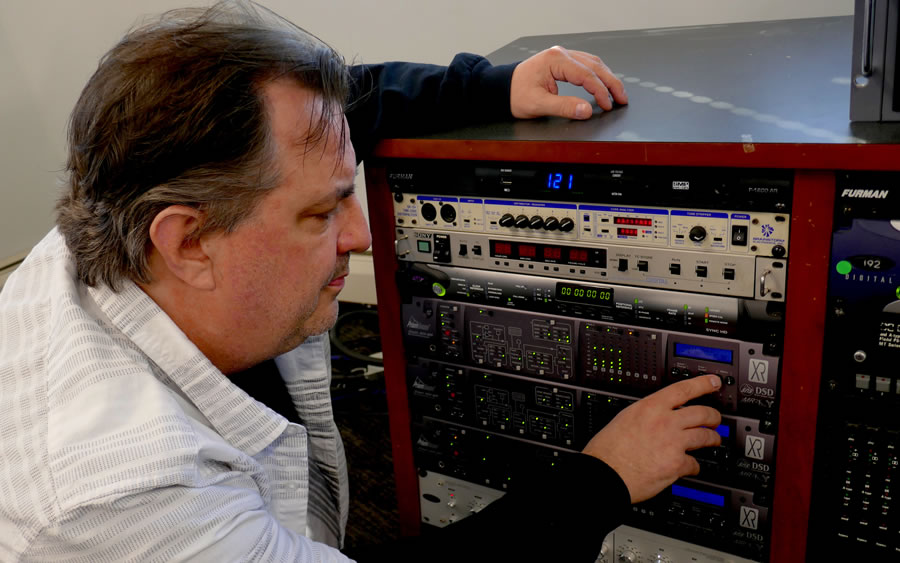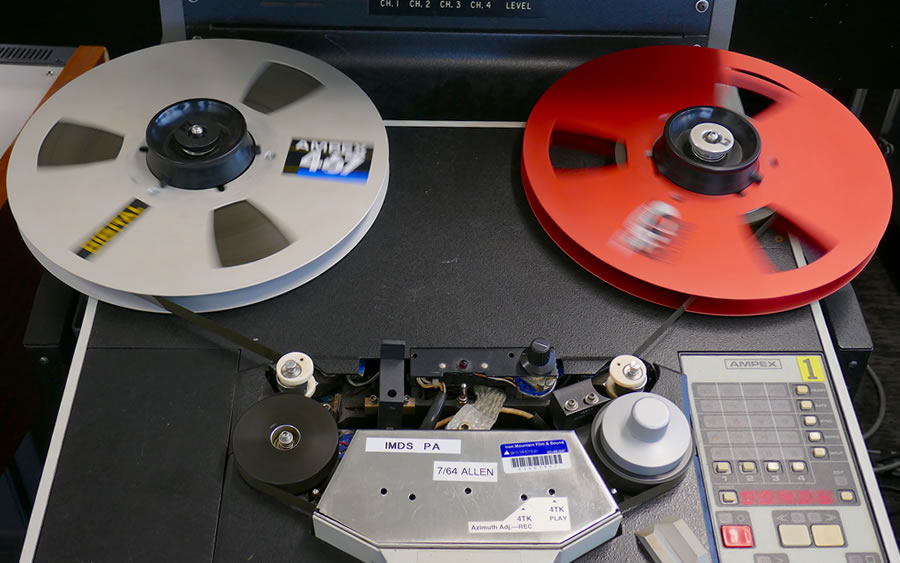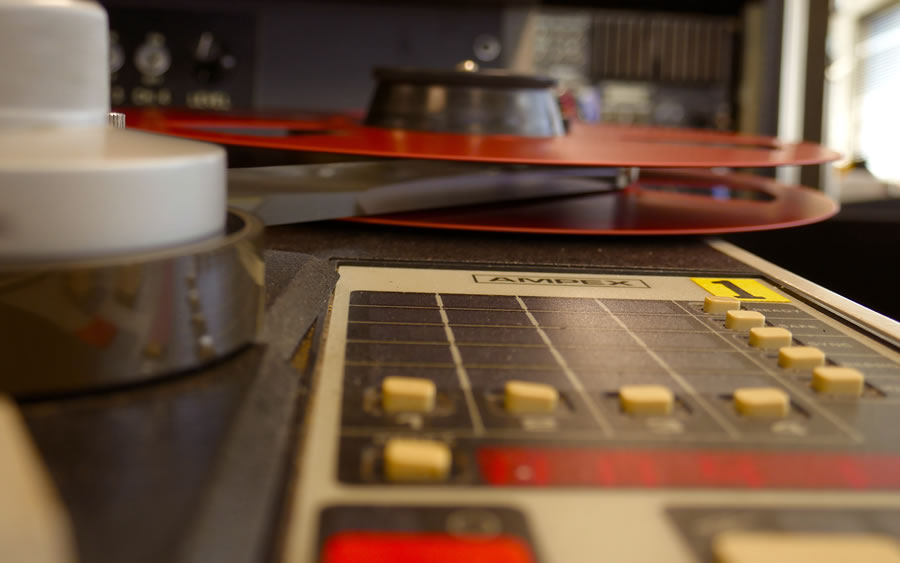Cambridge, UK: September 28th 2020: Iron Mountain Entertainment Services (IMES), the leading physical and digital media archiving service for the entertainment industry, is using Prism Sound’s high quality ADA-8XR multi-channel converters as part of an ongoing process to restore and preserve historically important audio tapes for its media and entertainment clients.
Many priceless recorded masters are in danger of being lost forever due to their age, their condition and natural degradation – a situation often exacerbated because tapes haven’t been stored safely. As a result, music labels and artists are in danger of losing valuable assets.
IMES provides expertise and technology in media storage, tape restoration, digital preservation, and asset management to protect, preserve and maximise the value of clients’ content – all delivered with the local, highly personal service of a boutique entertainment company, as well as the unparalleled safety and security of the Iron Mountain name.
“IMES has a vital role to play in the preservation of historic recordings so that they stay safe for their owners and for posterity,” says Meg Travis, the Global Head of Marketing for IMES. “Our customers trust us to handle their property with the care and respect it deserves, and we take pride in providing the highest levels of expertise and security. When it comes to restoration, they also trust us to use the best equipment for the task, and to have the most knowledgeable and experienced staff.”
With over 22 million assets (and counting) in its vaults, Iron Mountain’s Entertainment Services division is the go-to storage and preservation specialist for many of the world’s top record labels, film companies, academic institutions, and individual artists. Whether it’s the GRAMMY Museum, the University of Southern California, or countless other leading media companies and artists, IMES is a trusted partner when it comes to protecting critical assets to keep them accessible for future generations.

Principal Studio Engineer and lead for the Media Recovery Technology Program (MRT) is Kelly Pribble, a man whose music and pro-audio career spans more than 35 years. Kelly started as a studio engineer in Nashville and subsequently built and ran recording studios in the USA, London and Brazil, working with a plethora of top artists and producers. In 2010 he brought his years of experience to IMES, setting up the company’s global remediation service to salvage audio assets that would otherwise be lost.
“My role is to preserve historical audio masters and work with problematic tapes that might be suffering from any number of issues, and try to bring them back to life,” he explains.
“These priceless audio tapes come from all over the world and we are seeing some that are in a terrible state because of poor storage practices, multiple playings, or simply because they have faced the ravages of time. Sometimes they are mouldy, or they could be bound together or they might be suffering from a loss of lubrication–which means the tapes won’t play without remediation. You can’t play these tapes without damaging them even further, so we work with our clients to salvage the tapes and return them to their optimal form so they can eventually be digitized. We have a team of highly experienced engineers working in our studios in the US and Europe who inspect and restore these fragile analogue masters so that they can be preserved for posterity.”
IMES has Media Preservation studios throughout the US and Canada including LA, NYC, Chicago, Toronto and Pennsylvania, in addition to studios in London and Paris. The studios are filled with tape machines covering every format and every historical era. Some of these are antiques in their own right and require specialist knowledge just to keep them fully operational and maintained.
“We run tape every day of various format masters. We restore them into a stable condition where they can be transferred into a digital long term format,” Kelly says. “Tapes are physically stored in climate controlled vaults and are tracked through the digitization process and back to storage using an extremely rigorous chain of custody. This level of trust is vital as we are dealing with items that have huge historical value to our clients and are effectively priceless.”
Prism Sound’s flagship multichannel converters play a key part in the restoration process, with several IMES audio preservation facilities having at least 24-channels of Prism Sound ADA-8XR conversion available.
“Every analogue master that needs to be transferred to a digital format is put through an ADA-8XR converter because we recognise them as the best AD/DA converters on the market,” Kelly explains. “Having the best possible equipment is part of our commitment to our customers – they trust us to deliver the highest quality audio, so we use equipment that we trust and can rely on.”
At home in many of the world’s most iconic recording facilities (Metropolis, Abbey Road, British Grove Studios etc), Prism Sound’s ADA-8XR has been used on numerous high profile music and film recording projects including the soundtracks for many blockbuster movies. This multi-channel AD/DA converter can be configured in numerous ways to suit a wide variety of applications and it can also act as a high resolution interface for a wide range of Digital Audio Workstations including Pro Tools, Logic, Nuendo and Cubase. During its 20 plus years on the market it has become the converter of choice for many top recording professionals because it delivers such clean, transparent audio.


“We use Prism Sound converters because they are so reliable and versatile,” Kelly says. “When you are digitising historically important analogue tapes you want to be sure the converter is not adding or detracting from the sound of the original recording. With Prism Sound, we can be confident that the audio is of the highest quality and that it is exactly as it should be. We trust them for this reason.”
Another format that is generating renewed interest in archived material is Dolby Atmos Music. This immersive audio format has taken off on music platforms such as Amazon Music HD and Tidal, which are now streaming thousands of tracks in Dolby Atmos. It’s anticipated that many more labels, producers and individual artists will want to create immersive audio content, giving new life and value to older recordings. For many this will involve remixing classic back catalogue material – and that means accessing original master tapes so that the Atmos mix engineer has specific stems to work from and control over individual instruments in order to re-combine them in a 3-D space.
“Dolby Atmos Music has really shined a light on the importance of looking after all tapes because it’s not just the final master you need to protect – it’s all stages of the recording,” Kelly Pribble explains. “We now have a dedicated – and very busy – Dolby Atmos stem room in our studio in New Jersey. Labels are pulling their original multitracks from the archive, checking that they are OK and asking us to create stems from these archive tapes so that they can send digital versions to whoever is remixing the track in Dolby Atmos.”
Kelly and his colleague Alex Tomlin, who is based in the UK, are engaging with record labels all over the world via webinars where they explain the urgency of the work they do and try to spread the word about how critical it is for the music industry to preserve its aging recordings. In a recent webinar they highlighted how Kelly was able to salvage 54 two-inch masters from a major recording artist that would have been completely lost if he hadn’t stepped in.
“The tapes, which covered two albums this artist recorded in the 1980s, had been sent to another studio where the engineer was having problems because the tapes were bound together,” he says. “Luckily, the engineer had heard about my restoration work and contacted me for help, so I took a look and managed to get them all unbound and successfully transferred into a digital format, using Prism Sound converters.”



